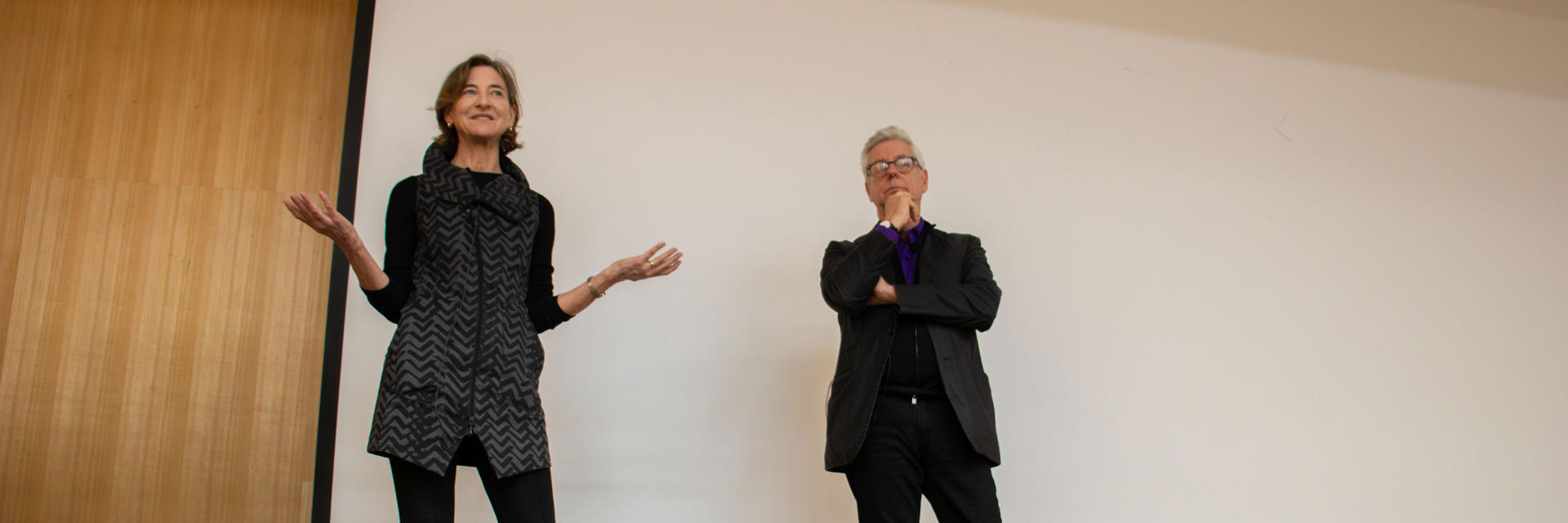
Weiss and Manfredi Explore Landscape's Legacy
in 2024 Douglas C. Allen Lecture
Weiss and Manfredi Explore Landscape's Legacy
in 2024 Douglas C. Allen Lecture
The 2024 Douglas C. Allen Lecture featured Marion Weiss and Michael Manfredi examining ideas of how acknowledging a site's existing landscape can enrich architectural development.
"The marks that we discover on the land and then we leave on the land have longer legacies than we might even imagine," said Weiss.
Manfredi agreed. "All the way back to our very beginnings as collaborators, We felt that the architectural trend we were interested in was giving measure to things and people and histories that have been lost," he said.
"Architecture has a larger role. It's not just about making buildings but it's about engaging our world as we see it."
Weiss and Manfredi are the founding principals of Weiss/Manfredi. "Their work and their practice challenges traditional, disciplinary distinctions between architecture, art ecology, landscape architecture, engineering landscape architecture, engineering and urban planning," said Julie Kim, chair of the School of Architecture.
"They regard the existing site as an architectural condition that's already rich with possibilities. So, in their minds access superimposing new programs on the site can bring into focus that which is unseen, and it creates opportunities for invention, for transformation and for use."
Through their lecture, Weiss and Manfredi expanded these ideas through examples of their work integrating landscape and site ecology with architecture, including La Brea Tar Pits museum, the Brooklyn Botanic Gardens, and Seattle's Olympic Sculpture Park. They also discussed the effects of changing climate on planning a site's long-term ecology, and what native species even means in a changing environment.
The lecture series focuses on landscape architecture to honor Douglas C. Allen, who was a long-time member of the faculty, interim dean, and worked closely with Tech's capital planning to shape the development of campus.
Howard Wertheimer, lecturer in the School, worked closely with Allen across years at Tech. "I came to Georgia Tech to lead the capital planning and space management portolio, and I was the Institute architect," Wertheimer said. "Doug had a hand in redesigning the courtyard in East Architecture and was instrumental in moving the redesign of Hinman forward, changing it from a shop to a space for architecture studios and labs."
Allen's legacy continues through the lecture series, Wertheimer said. "The people who coordinate those lectures are bringing in some incredible thought leaders who talk about the integration of architecture and landscape, engineering and technology, and ecology and sustainability. And beauty."
"I try not to miss it every year."
Wertheimer was also a student when Allen was still a faculty member. "Doug was always very approachable as a professor and always had a smile on his face. As a student, oftentimes there's a perception that you can't approach professors, but he broke down all those barriers and was incredibly approachable."
"Doug is probably the best storyteller that's ever come through the Schoo and he taught generations of architects, literally generations of architects over 30 years," Wertheimer said. "He gave them an introduction to landscape architecture, and he expanded his teaching portfolio way beyond grading and doing site planning efforts."
"The School was a special place to Doug that he loved and was committed to for virtually his entire professional career."
Questions?
Contact Us